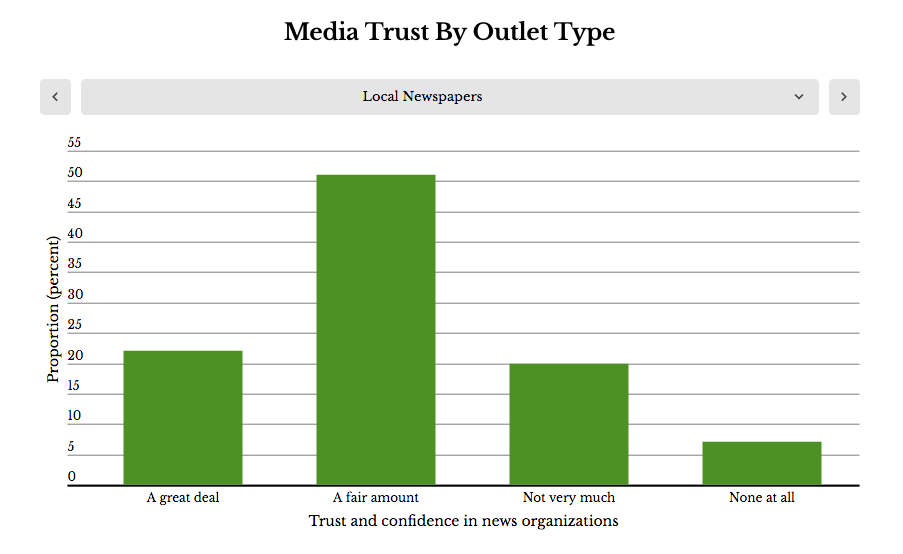The Poynter Media Trust Survey released this month shows trust in the news is increasing — especially of local news.
It’s still a long way from solid. In fact, “tepid” is the word used by researchers Andrew Guess, Brendan Nyhan and Jason Reifler in their report.
As a whole, the public supports the press, though perhaps only tepidly. For example, when respondents were asked “how much trust and confidence do you have in the mass media — such as newspapers, TV and radio — when it comes to reporting the news fully, accurately, and fairly?”, only a narrow majority of respondents (55%) answer either “a great deal” or a “a fair amount.” The lack of intensity in public support is most evident in the divide those two responses — 44% say they have just “a fair amount” of trust and confidence in the mass media versus only 12% who say “a great deal.”

I suppose we’ll take what we can get. But “tepid” support doesn’t overly concern me. As I’ve said many times, people should be skeptical of what they read, and they should question the motives of the people and companies doing the reporting. Trust is earned or lost every day.
At a recent conference of Newspaper Association Managers, we were reminded just how much more can be done to educate readers on the basics of journalism. What does “attribution” mean? What is a credible source? How are facts checked? What do editors do? What’s a publisher?
As someone who contributed to putting together content for public consumption nearly every day for more than 30 years, I’m keenly aware of the kind of mistakes that were made, how shortcuts and inattention contributed to inaccuracies. I also know how many arguments we had over whether a paragraph was fair, or how the usage of one word over another created a false impression. I know how many times we cut the story because “when in doubt, leave it out.” And how many times we held a story for a day or more because we needed to talk to one more person, or we needed to get one more confirmation of something that seemed to be fact.
Such standards of fairness, accuracy and context are the basis for decisions — made hundreds, probably thousands of times a day — that add up over time to whether your work is trustworthy. Do you let them slide, or do you apply them with rigor to even the least significant of your work?
A former publisher, Jeff Ackerman, used to compare the daily newspaper to a restaurant. “You can’t say to your customers, sorry, you should have been here yesterday. The food was really good.”
Here’s more reaction to the study.
 Nevada Press Association The best in Nevada journalism since 1924
Nevada Press Association The best in Nevada journalism since 1924
